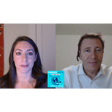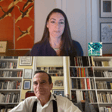Introduction: Host and Guest Introduction
00:00:06
lpaltiguzman
Welcome to Energy Vista, a podcast on energy issues, personal and professional trajectories. I'm your host, Leslie Palti-Guzman. It's May 8th, 2025, and time for a new Energy Vista episode.
00:00:21
lpaltiguzman
so Today, I'm exchanging with David Abraham, a faculty member at Bois State University. David is the author of The Elements of Power, published by Yale University Press in 2015, and was very prescient and had a lot of foresight to see everything's coming up right now with the methyl mining, ah rare earth discussions and and how rare methyl are shaping global power.
00:00:48
lpaltiguzman
um So that was 10 years ago. Hi, David.
00:00:52
David
Hi, Leslie. Thank you for having
Historical and Modern Importance of Minerals
00:00:54
lpaltiguzman
Yeah, and congratulations for, um you know, and pretty much anticipating and predicting way ahead of mainstream um today's discussion or around minerals. um I wanted before to dive in into today's discussion where we're going to talk about all the front page news around rare minerals that we should probably have paid attention 10 years ago, 20 years ago, 30 years ago.
00:01:24
lpaltiguzman
thirty years ago But I wanted to acknowledge today's date. It's May 8th. It's the 80th anniversary of Victory Day, and the victory of the Allied Forces, yeah marking the end of World War II, and the capitulation of Nazi Germany and the rest of the Axis. And you know it's a good reminder that without key minerals like iron, tungsten, magnanese, zinc,
00:01:55
lpaltiguzman
um the Allied forces wouldn't have been able to fuel their war efforts. And these materials are still the backbone of our military, like for tanks, ammunition, and other essential war materials.
00:02:11
lpaltiguzman
and Do you have any you know take on this, like for the next war? um Are we ready?
Resource Dependency and Global Implications
00:02:20
lpaltiguzman
I kind of know where you fit in because I just saw your op-ed from a few days ago that how the United States lost the Earth material war to China.
00:02:33
lpaltiguzman
um But without going too big picture, or like how how are we doing right now for war military preparations?
00:02:42
David
I think if you look at the the past, you you've you highlighted one side, which was the US and having access to resources. But I think if you look at the other side in Germany,
00:02:53
David
and Japan and their inability to get resources. The fact that that iron ore was was was roughly three times the cost in Germany than it was at the rest of the world because it couldn't it it only had its own resources became a challenge for Germany.
00:03:08
David
you know When we and the US cut off resources to Japan
00:03:14
David
it it far It sparked a a serious backlash. um The question is, do we have the resources we need for a conflict or or just a the overall economy without trade? The answer is is no.
00:03:29
David
But that's true for for all countries. That's true for the UK, that's true for Japan, that's true for Germany, I mean, ah China. um
00:03:37
David
so So it's a question of of what does our society rely upon? and the the materials that are in front of us every day. They're half the elements known to man in front of this computer screen that's in front of you at you and I.
00:03:51
lpaltiguzman
The cell phone, the the screen, everything.
00:03:53
David
right Right. So while there is definitely a challenge in terms of, hey, do we have the resources for the for the magnets or the the semiconductors or batteries?
00:04:05
David
The answer is is no. But there is not a country that feels they're always secure ah the whole way through.
00:04:14
David
yeah there's there's always there's There's always concern.
00:04:18
David
um i think you you will If we're talking about China, um they're concerned. they They have enough resources that they they need. Oil and gas, copper, a whole slew of of of of rare metals.
00:04:31
David
So the answer is no, the U.S. doesn't have what it needs.
00:04:34
David
But i think overall, this mutual dependency on resources creates an opportunity for stability as well as instability.
00:04:45
lpaltiguzman
So you've been raising the alarm now for a while, and I have your book in front of me. um And that is terrific, by the way, I recommend to everybody.
00:04:56
lpaltiguzman
And you have an updated version, I think, coming up soon, 10 years after. um So you warned about our dependence. ah you You warned about China's dominance in rare earth and critical minerals.
00:05:09
lpaltiguzman
And you wrote a book about it. I'm sure you did a tour and you spoke at different think tanks and universities. Did you feel at the time that you were listened to that you were just like um like Cassandra, right? like um You called it like the war over the periodic table way back and it's happening right now.
00:05:31
lpaltiguzman
And so how did you feel at the time and how do you feel now?
Global Reliance and Strategic Responses
00:05:34
David
Well, the working title for the book was War Over the Periodic Table.
00:05:38
lpaltiguzman
Which is an amazing title.
00:05:39
David
That's what the book was supposed to be.
00:05:40
David
So I couldn't get it.
00:05:43
David
i couldn't get approval for that title. um Yale at the time i was the press and said, no, we don't think that's the the right title. War is a bit much. um So if you look at the the first chapter, the first chapter is called War Over the Periodic Table.
00:06:00
David
So there was a sense, um hey, this is an issue, but how serious is it? And it never, at least in the US, s rose to the level of, hey, this is something we need to take very seriously.
00:06:15
David
In Japan, there was a sense of, well, we rely on materials to make the high-tech goods that we have, so we have to be concerned about our supply lines. There was a little bit more sense in Germany as well, and obviously there was a sense in in China.
00:06:29
David
But the reason why those countries were were were concerned about materials, because those were the countries that really relied upon the critical minerals for inputs into your products.
00:06:42
David
and And so they understood their importance, where a country like the U.S. doesn't rely upon them very much for for the production, because it doesn't have the industrial capacity that those three countries have.
00:06:57
David
um So at that time.
00:06:58
lpaltiguzman
And you remind, yeah, you reminded us also in the book that Japan got kind of a, a red flag when China decided to cut also some of the exports of some of those minerals to Japan back in 2010.
00:07:13
lpaltiguzman
So this has probably also accelerated Japan's strategy around minerals.
00:07:19
David
Yeah, they were very concerned and then they took a two pronged approach at that time. So in 2010, um ah China had had cut off the access of of rare earths, a subset of of critical minerals or a subset of rare metals that are really important for magnets. Magnets are really crucial for motors and high efficiency motors.
00:07:43
David
And And so when that happened, Japan did two things. um One, it started to search for other other sources, whether that's recycling, ah whether that's mining.
00:07:52
lpaltiguzman
Right. Yeah.
00:07:55
David
And then secondly, which made seem counterintuitive at the moment, more Japanese countries companies went over to China to build facilities because they wanted the companies wanted access to resources.
00:08:09
David
And so if you couldn't bring it to your shores, you could produce within within China. and And so you saw that happening as a response.
00:08:18
David
So for the Japanese companies, they had access to resources in in that way.
00:08:22
David
That seems to be something that's not going to be happening at this time.
00:08:27
lpaltiguzman
So since the beginning of 2025, a new administration, a new president, it seems that it has become front and center with different executive orders. Why was it so slow?
00:08:39
lpaltiguzman
Or do you feel like it's more pressing as an issue right now? And and you know, do we have finally in the US a national strategy and cross agency effort to put together a real, you know, whether it's bringing back domestically some production and mining or venturing abroad and partnering with capable partners. Like, do you feel like everything is coming finally together or it's going to be a very, very long process?
00:09:14
David
Well, it's a process where this administration has really said um we're concerned about resources.
US Resource Strategy and Supply Chain Focus
00:09:22
David
And so it's really raised the flag and it seems to be a ah guiding mantra within the administration. So whether it's conversations and in Saudi Arabia um that'll be forthcoming or whether it's conversations It's having with with Ukraine. they It drives conversations.
00:09:44
David
People understand that we have to somehow get access to resources. But i don't it's it's in the process of becoming holistic.
00:09:54
David
So what you have is the is the focus on getting things out of the ground. And that's a very important thing. And now there's increasing um focus being put on processing the minerals, turning it into a usable form.
00:10:10
David
But if we don't have an entire supply chain, um then then we're still stuck. So what you need is is the focus on the and entire supply chain. so What some things in the last administration was really focused on was ah green technologies.
00:10:28
David
And so when you have green technologies, all of a sudden you have demand for these resources. So by focusing on the supply, um that alone won't be sufficient.
00:10:39
David
We have to start focusing on on demand because that's, in my opinion, what really sparks sustainable supplies is if they know where they are going.
00:10:52
David
Rather than, oh, that's because if you reflect on the Soviet economies, there was a lot of focus on on producing supplies and people didn't always know where those materials or where those products were going.
00:11:05
David
But really what sustains economies is the demand.
00:11:09
lpaltiguzman
yeah you have a really good Yeah.
00:11:09
David
And so I think there's got to be more focus there.
00:11:12
lpaltiguzman
yeah You have a really good line in your book that, you know, for the, let's say for the iPhone or, um, you know, any tech that we're using right now, the engineers working on them were thinking about the what is the best mineral for the purpose of the tech, but not necessarily where is, which one is the more abundant or which one is the easier to access, right?
00:11:40
lpaltiguzman
Do you think there should be also a coordination with all those clean tech company, clean energy or tech company, military, like to have this kind of holistic approach, as you were mentioning, where it's,
00:11:55
lpaltiguzman
the the mineral has a purpose, technically speaking, but we also need to consider how easy or not is it to access it, to mine it at home abroad, right?
00:12:08
David
Right. the the i I think that's I think it's a it's a it's an increasingly important point. What we've used to have is that companies were very aware of the cost of a particular component or mineral.
00:12:08
lpaltiguzman
And how expensive I guess it is or not.
00:12:25
David
And therefore, if they knew the cost was high or going to be high, they might substitute around that. And so that's kind of economics.
00:12:33
David
um But you add in a layer of ah material uncertainty and That does affect price, but not as not as clearly. And I think what you've seen over the past few years, um but there are times where it's happened in the past, is that people said, well, I don't want to deal with X material or Y material.
00:12:52
David
So they tried to engineer around it. um And that creates an opportunity for your you to have very strong or more stable supply lines.
00:13:03
David
and be able to produce something, but it also puts you at a competitive disadvantage.
00:13:08
David
If you cannot use X or Y material that produces a better product, then you're going to have to figure out how to make your product more efficient or faster or stronger to compete against companies or countries that have access to those resources.
00:13:23
lpaltiguzman
Yeah. Yeah. So let's let's break down like the two track approach. And the first track is ah basically being able to partners with allies, right? Or countries that have those resources. And so they already have mining or they already have refining capabilities.
00:13:43
lpaltiguzman
Which one are new? Like you mentioned Saudi Arabia, I think now it's a front and center also for Saudi Arabia as a new strategy to remain relevant.
00:13:54
lpaltiguzman
beyond fossil fuels, and they are trying to position themselves in the supply chain. um We heard a lot about the Ukraine-US mining deal. and We heard so a lot about Greenland and more recently about ah seabed mineral resources and going offshore.
00:14:13
lpaltiguzman
So that's a lot. ah But ah do you think like we need to basically strike everywhere to see what's panning out and in terms of results and see at the end of the day, i mean, diversifying basically the strategy and going into multiple places?
00:14:32
David
diversifying is always a strong strategy whenever you're talking about resources. But the ability, we have a little bit limited ability to to function on our own. We don't have a strong mining economy.
00:14:47
David
lot of our companies A lot of the better companies are are either in China or they're in Canada or they're in Australia.
00:14:54
David
We don't have the capacity to set up mines in a lot of those jurisdictions, even if they are the right place to be. So there's ah there are a number of things that we're we're going to have to do.
00:15:08
David
Partnering, like you say, with countries is is one thing that's really critical. um Ensuring that supply lines can go to where they're needed. For example, of of of rare earths, do we need the facilities within our own our own borders?
00:15:22
David
um Or would they be fine in Canada? Would they be fine in in in partnering countries? It would be hard pressed for me to say that, well, if if Canada has a robust supply line, then the US is short um because it doesn't have it within its own borders.
00:15:39
David
um I think that would be a little bit short sighted. History says, um and you use World War II as an example, if you have access to resources through partners, it can be just as efficient and as having access to resources or more efficient than having access to resources within within your own borders.
00:15:57
David
um and And so I just generally feel that that
Innovation and Competitive Edge in Mining
00:16:02
David
working with allies is is helpful, but each ally is different. So Saudi Arabia, um they're mapping their country and hoping that they're going to strike oil twice.
00:16:10
David
I don't think Saudi Arabia will be the Saudi Arabia of of rare earths or the Saudi Arabia of lithium. I think you know, they've they've done well with with but oil and gas. and and And so that's I think that gives them leverage to invest elsewhere.
00:16:28
David
um So what's what's what's more fascinating to me is where does the capital go?
00:16:33
David
Does it go to projects in and Brazil? Does it go to projects in, you know, where where where does there where do the financial resources go?
00:16:42
David
And then in a country like Greenland or Brazil, South Africa, then we're really talking about the minerals themselves. and And we're not partnering with them for access to capital.
00:16:56
David
um We should be figuring how capital can go there to support the resources that we think the world needs.
00:17:03
lpaltiguzman
Okay. Do you see the U.S. companies going in the same place as where China is going? And is it problematic over the medium term, long term?
00:17:14
lpaltiguzman
Should like China has its own ah suppliers and the U.S. its own suppliers? or we can both have the same supplier?
00:17:22
David
I think if we're going for different resources, then we're kind of misguided because we should really be going where the geology is and where the best resources are able to be gotten.
00:17:37
David
And there will be places where we compete. There'll be places where they have a leg up. There'll be places where we have a leg up. um But right now, we they do have more of a leg up because the difference is when they come in they can come in with capital and then they can come in with knowledge and they can come in with the ability to extract the resources and do it at a large scale and do it quickly and efficiently. like um We cannot.
00:18:04
David
and And that's the kind of capacity that we're going to have to work on internally and and we'll have to work on with other countries. And we'll also have to figure out how to work on that with China in some way.
00:18:15
lpaltiguzman
Yeah. So, and you mentioned that I think in your last open that maybe the solution is not to imitate and replicate what China is doing, but come up with for own way of doing and ah big advantage and an age that the US has always ah had was is to put money and efforts into new technologies, right?
00:18:37
lpaltiguzman
Do you see like um and some hope in a way in finding new technologies that could accelerate the mining process or the refining process and give edge to the US?
00:18:53
David
wait That is where the opportunity is, is to find a way to make resources that were once um not profitable to extract profitable because of a new way to target the resources, a new way to refine the resources.
00:19:08
David
um that's That's a critical function and their breakthroughs to be had. The challenge that you have, however, is that mining projects are very, very, very expensive and they're...
00:19:22
David
they're unwi they're less willing to invest in unproven technologies because of the projects that are so expensive. So on one hand, we do have to innovate and we have to innovate quickly. At the other hand, we are going to have to figure out how to use existing technologies um to produce some of the material now at costs that would be competitive globally.
00:19:43
David
That last part is going to be very, very hard. um
00:19:47
David
I don't believe that the with the the cost of capital and and with the ability that ah China has that we'll be able to catch up to the ability to to to produce materials as efficiently as they can.
00:20:00
David
So I think that's a given.
00:20:00
lpaltiguzman
So I think that's a key point.
00:20:01
lpaltiguzman
Yeah. Yeah. I think that's a key point and so important in so many strategic ah sectors.
Financing and Investment Strategies in Mining
00:20:10
lpaltiguzman
where financing is the bottleneck basically.
00:20:14
lpaltiguzman
And for the second track, if the US wants to bring back at home mining and processing and, you know, ensuring again the supply some part of the supply chain at least, solving this financing issue is going to be critical.
00:20:30
lpaltiguzman
and Many people start to speak about a sovereign wealth fund or having more like state sponsored money ah being invested in some of those key technologies or projects.
00:20:44
lpaltiguzman
Do you see a role here and do you think it will enable the competition with China to be more successful?
00:20:53
David
Well, we're cutting a lot of foreign aid. um We're cutting a lot of ah kara of of other types of assistance um within our our budget.
00:21:05
David
um So that does free up capital. We'll do things in in a little bit of a different way. um and And we will have to figure out how to marshal resources as an economy, not necessarily completely as a government, but as an economy to do that.
00:21:18
David
And so i think there are probably thoughts. I can't speak to any specific thing, but I think there are people within the government who are thinking about how to marshal these resources and and they would be there.
00:21:29
David
um Is that the best way to compete against against China? Again, we're marshaling resources, but um who Who do we have on the other end who can spend it and help develop the project?
00:21:42
David
And that's where we'll we'll meet international partners for that, um just because we don't have the the the manpower to be able to to to develop.
00:21:54
lpaltiguzman
I think for the Ukraine mineral deal, and the DFC is involved. And I guess Exim, the Exim Bank could be involved in other projects. Or I mean, there are already existing agencies that could maybe already help, right?
00:22:12
lpaltiguzman
Existing ones.
00:22:12
David
Well, there there are. the The thing is, is that if they were that promising of a resource already in 2015, they have been after
00:22:21
David
they would have been gone after that Now you're you're coming into a country that's been in war and and hopefully it will get out of war at some point, but then it's still in an unstable area.
00:22:33
David
So who are you going to convince to come in with X amount of resources to to develop that? Plus, it's not clear they have the a lot of the resources that are most important for us.
00:22:46
David
um you you know Countries like South Africa,
00:22:48
lpaltiguzman
So if we can... have yeah
00:22:50
lpaltiguzman
yeah If we can stop just a little bit on here, because I have the map in front of me, I was checking yeah what does Ukraine mineral deposit map look like. So there is a little bit of titanium, uranium, lithium, manganese, graphite, and others.
00:23:09
lpaltiguzman
um I guess those are potential underground resources, right? like we Until you really explore it and
00:23:18
David
They'll probably remain underground. Most of them will probably remain underground.
00:23:22
lpaltiguzman
Okay, so can you elaborate a little bit on that?
00:23:22
David
um ah Sure. it's it's there're There are resources everywhere. um and And the question is, are they economic to get out?
00:23:36
David
and and And for the foreseeable future as I see it, um there aren't going to be billion-dollar investments going into Ukraine for the development of ah mining resources that would be at any scale that would put Ukraine at the forefront of global mining.
00:23:53
lpaltiguzman
Mm-hmm. Mm-hmm.
00:23:53
David
And I think we're we're better at looking at places that have traditionally more resources, whether they be Brazil or South Africa or Indonesia or or Congo. And not saying DRC is a is a easy place to invest in. It's it's and it's it's complex in a different way than than Ukraine is.
00:24:14
David
But I think there are more opportunities elsewhere than Ukraine. um I think what the mineral deal signals to people is that the US does have an interest in in in developing the the resources that are there.
00:24:29
David
um But does it give anyone any specific incentive to go in? No.
00:24:36
lpaltiguzman
And it gives potentially a crane, some, some kind of indirect security guarantees.
00:24:41
David
Yeah, well, that that I'm not going to weigh too much into the like, what what does it do for the war effort? Or how does that align Ukraine and Russia? I mean, Ukraine and the U.S. visit Russia.
00:24:52
David
um i'll so I'll stay out of that. um but But in terms of actually developing minerals, it's a political flag that, hey, if someone's interested in developing resources, I think the U.S. would be very supportive.
00:25:05
lpaltiguzman
Yeah. So coming back to the um financing, I was not even aware, but I saw a headline this week that the CIA has a venture capital arm and they just invested in Alta Resources technologies that apparently has a new technology to mine
Role of Government and Venture Capital
00:25:25
lpaltiguzman
with protein.
00:25:25
lpaltiguzman
So I'm not an engineer. I don't even know what it means, but it seems to be a revolutionary way to mine. And, you know, we were talking earlier about new technologies. So it's kind of a combination of a state sponsored agency, putting money into a new startups technology.
00:25:47
lpaltiguzman
So did you do you see those kinds of partnership promising?
00:25:52
David
Well, have DOD that's interested, Department of of Defense, the Department of ah Commerce.
00:25:57
David
There's a whole bunch of Department of Energy's been putting money in coal ash and what resources are there. um Most of those will fail. um But that's okay because that's what we expect.
00:26:12
David
And that's why they're either venture funds or or there they're sponsored research. The government's role is to be able to um enable capital through itself or through others to to find um new opportunities that might not get invested in, whether that's you know health or resources.
00:26:33
David
um So i think I think it's really important that the U.S. continues to do that type of activity. But they have to realize that, yeah, its a lot of it will will fail. It would be helpful if the U.S. government has more knowledge capacity within ah the government. I think the Department of Defense has some real ah smart people working for it, ah Department of Certain Pockets the Department of Energy.
00:26:57
David
But we we as a country don't have... a large wealth of knowledge in mining.
00:27:03
David
and And so a lot of the investments that we're making tend to be the people who are loudest in the room.
00:27:11
David
And that's ah that's a bit bit a challenge because the people who are, you know,
00:27:17
David
C-Bed mining folks, are they the best people to determine which resources get stockpiled or not? I would probably argue, no, you'd want to have an expert who looks at which resources should be stockpiled.
00:27:27
David
But right now it seems like, hey, they're they're getting ah an ear.
00:27:31
lpaltiguzman
Right. How do you not pick winners that are, um you know, that have the best lobbyists in the White House, basically?
00:27:41
David
or Or in Congress, or in Congress.
00:27:41
lpaltiguzman
Yeah. Or in Cumberland. Yeah.
00:27:44
David
Yeah, you have people who are just, and And so that's where Japan has a little bit of a leg up because there is more. ah ah used to work in the Ministry of Economy, Trade and Industry there.
00:27:55
David
And they they don't drive the the industry, but they work closely with them to understand some of the challenges and opportunities.
00:28:04
David
and And so it's easier for them to to push certain technologies or understand what may work and what doesn't, where our relationship between business and government has not traditionally been that.
00:28:16
David
And so it just puts us at a disadvantage to make large decisions quickly. So we kind of outsource that to to the lobbyists.
00:28:24
lpaltiguzman
Another um reason maybe to have the government more involved in those financing of yeah strategic mineral project is, as you mentioned in your book, Like the mining projects are long-term.
Market Volatility and Long-term Investment Challenges
00:28:38
lpaltiguzman
Sometimes they run into delays. There are costs overrun. By the way, I see a lot of parallel with an industry that I'm much more familiar, which is the energy energy industry, right? It's like billions of dollars that you have to inject.
00:28:53
lpaltiguzman
You don't even know if you'll reach final investment decision and then the market can switch around. But like the mining you were mentioning, like the we need investors that are here for the long run, right?
00:29:04
lpaltiguzman
And see also the strategic, because the commercial um impact of the project may not always be relevant, right, at all time, but the strategic component is here.
00:29:18
lpaltiguzman
So, you know, there is kind of a dichotomy here where the US is really relying on the private sector um that the private sector lacks quick returns on their investments.
00:29:32
lpaltiguzman
But this is a long supply chain, it takes a long enough time, you know, longer a long time, lead time to get it off the ground. And so you need investors that are here for the long term. So how do you make this happen?
00:29:42
David
and Well, I also think Leslie, you highlight some an important parallels. So an LNG project, project what do they range between what, two and 10 billion?
00:29:53
lpaltiguzman
Oh yeah, like the recent ones, I mean, you know, Mozambique is like 40 billion.
00:29:57
lpaltiguzman
The latest latest one in the US is like more closer to 20 billion.
00:30:03
David
okay so so yeah the The mining projects aren't that that that dear. um But if you're looking at a couple billion, um the difference is is that you know once you get LNG, once you get natural gas up, there's a market for it. ah you you know you can You know there's going to be demand.
00:30:25
David
Yeah, there's there's price and it's volatile, but but you know that this so you know that there's that there's a market for it.
00:30:32
David
These minerals, you don't have it because they're highly volatile and because it's not a liquid market that investing that amount of capital is just increasingly, increasingly risky.
00:30:45
David
A new technology could come along and then wipe out the demand. Now, historically, on average, demand continues to rise. Even we might wipe out one um use.
00:30:57
David
Demand continues to rise. rise But investors aren't they aren't thinking like that. And so the the real challenge is is this is the stable long term.
00:31:10
David
um and And is there a market for once the resources um ah come out? And that's always been the real challenge. In China, they said, well, we we're going to demand the resources anyway.
00:31:22
David
um So we know we're going to need them. you know The cost might be x y or Z, but we know we're going to need them. But in the U.S., we're producing the resources again, going back to the beginning of the point.
00:31:34
David
We want to produce resources for an uncertain demand, and it's not even within our shores.
00:31:38
lpaltiguzman
Yeah. but So give me one mineral that is being used in the cell phone, in the iPhone or...
00:31:44
David
um Let's go dysprosium.
00:31:47
David
Dysprosium is in are in magnets in high temperature environments. um Like the phone gets very warm and very hot and it makes the phone a vibrate.
00:32:00
lpaltiguzman
So you're telling me that even though it seems that you know we all have those gadgets now, that the demand is uncertain? Like if I'm going now to mine for this mineral, I'm not even sure about the demand in like three, five, 10 years from now?
00:32:15
David
But they can change. oh If you look at how much dysprosium is in your phone, it, you know, yeah.
00:32:24
lpaltiguzman
Tiny, tiny amount.
00:32:25
David
So yeah, you pour a couple of grains of salt.
00:32:28
David
um So it's, there these materials are used in very small quantities.
00:32:34
David
You know, thin film technologies, so you you can't even, so you know, there the materials aren't used in in a tremendous amounts. which makes a new technology coming on um um can can shift, if battery technologies shift, the amount of manganese or the amount of of of of of of nickel in ah in ah in a battery can vary drastically.
00:33:02
David
So um now nickel is a much bigger market than say tellurium or selenium or dysprosium. um so So I think that that because these markets aren't liquid and because when you get LNG out of the ground, it's in really, and don't know, you one form.
00:33:18
David
um And you sell that form. But the the dysprosium, it's got many different end uses.
00:33:25
David
And so therefore, um you have to be able to create a product that can fit each one of those end uses. And that also adds to the challenge of of ensuring that you have processing.
00:33:40
lpaltiguzman
Very interesting. Are we running out of like zinc, copper or any other minerals that are widely used?
Career Path and Reflections on Mineral Sector
00:33:47
David
Yeah, um we are. the The good resources have been found, the the ones that are easier to mine. So ore grades, the percentage of ore in the ground that we're trying to to mine is is is dropping.
00:34:04
David
um So we have found the easy stuff. But just like the shale revolution in the U.S., there are new technologies that bring on new types of resources that that were difficult to find before.
00:34:17
David
But with that said, it's becoming more expensive to get those resources out. And so on one hand, yes, we're we're running out of those resources. um But I don't think that's the main challenge at the moment that we've we've hit the ground, you know, we've we've hit the end of neodymium.
00:34:34
David
um We've just haven't been able to unlock resources that are economic.
00:34:40
lpaltiguzman
Space is definitely not being going to be economic, but there is a lot of minerals in the space.
00:34:45
David
There's a lot of minerals in this space and there's a lot of minerals on the on the on the bottom of the ocean.
00:34:50
David
um and But you you have a cost issue. issue And then you have a processing issue.
00:34:59
lpaltiguzman
and And environmental issues, I guess.
00:35:01
David
And you have environmental issues, yes.
00:35:03
lpaltiguzman
Yeah. Good. So let's move to your personal trajectory, and David.
00:35:12
lpaltiguzman
So tell me a little bit how you got into minerals. um And i mean, you seem very passionate about it It's like a fascinating topic. And again, you were very patient and you were on top of it like way before anybody else.
00:35:27
lpaltiguzman
um And I like actually a lot the way um the the approach you had in your book, which was little bit like being a reporter and going to different countries, interviewing different CEOs, companies, going to conferences, and basically, you know, um having all those different kinds of perspectives from the government, from the industry, from the academia, different, you know, jurisdictions.
00:35:57
lpaltiguzman
um So tell us a little bit how you found yourself in this domain.
00:36:03
David
i I worked I had an interest in international affairs. i was in Peace Corps. I went to ah Tufts University's International Affairs School. and And right after school, there we are.
00:36:14
lpaltiguzman
we We went to the same school, by the way.
00:36:17
David
Yes, we did. and we and And after graduating, I went to work um in the US government at the Office of Management and Budget. And I was looking over the Office of Surface Mining and the Minerals Management Service, so looking at mining and and and resources offshore.
00:36:32
David
I figured that resources were inherently international, and understanding how the resource markets work, at least from the government and regulatory's perspective, would be interesting.
00:36:42
lpaltiguzman
So this in the White House was like i around 2023, 2020, like early to seven.
00:36:47
David
2000 So 2003 2007. so.
00:36:51
lpaltiguzman
So was there already a discussion at the White House, like high level about rare earth minerals and critical minerals or not yet?
00:36:59
David
Oh, we it was Cheney's energy policy, Bush's energy policy, which was really focused on and oil and gas and Arctic National Wildlife Refuge.
00:37:10
David
and And that was a lot of the focus.
00:37:13
David
So there I wasn't in the area of critical minerals. and and therere
00:37:18
David
And from my knowledge in 2010, looking back, there was not a focus in critical minerals.
00:37:25
David
But I left the US government, went to Lehman Brothers, um and I was looking at international investments at Lehman Brothers before the financial crisis, because Lehman was concerned about the risk because they were US bank and they were mostly focusing on US, but they were going to start to go into Turkey and Kazakhstan and Kyrgyzstan.
00:37:31
lpaltiguzman
Just before the financial crisis.
00:37:44
David
And that most of those investments were either in the tech space or in the like telecom space and and natural resources. So I was looking again at investment into natural resources while I was at Lehman.
00:37:58
David
When that fell, I ended up at an energy trading firm. um So I was seeing how commodities move.
00:38:04
David
And then in 2010, I took a fellowship with the Council on Foreign like with council on foreign Relations at the Ministry of Economy, Trade and Industry in Japan. And that's when China had cut off access to rare earths, to Japan.
00:38:18
David
and And I had kind of this ringside seat working in their ministry. as to what what was happening. and And I had worked in government, I had worked in commodities trading, and I thought I had a background in a number of different areas to understand these resources.
00:38:32
David
So um I was looking to to to write a little bit more and and and I decided to focus on and these critical minerals.
00:38:42
David
And we just saw from 2010, That society was going in a certain way, that these resources would become more dear. and And so a lot of the kind of arguments that people take, you know, the take is kind of at the foundation of the of critical minerals were stuff that I had to kind of learn on my own.
00:39:02
David
Because there weren't um there was there were books, the last one I think was written in 1978. And then there were books about ah minerals, but that was back in the days where most of the re of the ah the products that were used only used 10, 15, 20 resources.
00:39:22
David
Now, like I said, the half the elements no demand are in one.
00:39:25
David
So, so things have changed when they were writing those books because of the the different nature of the high tech goods of today.
00:39:35
David
So it was spending about two, three years trying to put together what was the challenge. And it looks obvious when you look at hindsight, but when you're putting the piece together, it's not as clear.
00:39:48
lpaltiguzman
Yeah, no, really, congratulations, because it's it's very well written, it's witty, it's very insightful. And, you know, for somebody who is not an expert in minerals, like I learned a lot.
00:39:59
David
You're very generous, thank you.
00:40:00
lpaltiguzman
Yes, yeah. and And so I'm curious, because you wrote this very good, excellent book. And then you went into entrepreneurial, an entrepreneurial journey, which had nothing to do with minerals, more into the...
00:40:17
lpaltiguzman
hospitality, travel business.
00:40:19
lpaltiguzman
So um how do you combine those two journeys?
00:40:27
David
Well, it was between when my book one come came out, um when we but when my book was written and when it came out, was about nine months.
00:40:36
David
And I was working on a side project in Bali where I had done some of the writing for my book ah to open up a space for for people who were working remotely. We saw a trend back in 2015, 2016, that increasingly people were, before COVID, before, yeah, exactly.
00:40:50
lpaltiguzman
Again, very visionary before COVID, before everything. So that, that. Yeah.
00:40:57
David
and We saw that trend. And and so I started to to do two things. One, continuing the research the work on critical minerals and then um focusing on on remote work, um which became we raised a little bit of capital. And when you have investors, you want to make sure that you're spending the appropriate time on and um um on the work that they've invested and trusted you So there was more focus, much more focus then.
00:41:22
David
um So, but during back in 2018, there weren't that many people focusing on critical minerals, so much so that, you know, I was called to testify three or four times when I was in Indonesia um in front of the U.S. Congress because there weren't that many people.
00:41:37
David
And now they're, there everyone became an everyone became an expert.
00:41:37
lpaltiguzman
Yeah. Everybody became an expert on minerals, that but you're the original one.
00:41:45
David
but But it's the real challenge is, is that you, you got to spend the time to understand what's happening. It's one thing to be able to know the story.
00:41:58
David
um But yeah people talk about different aspects of stockpiling or or or mining. But if you don't understand the geology or if you don't understand how to get those questions, the solutions that you're you're providing um may get 80% right, but it's that 20% wrong that is really going to screw up your advice.
00:42:20
David
And so there is a lot of advice out there. And that's really misguided. I've not seen so much.
00:42:31
David
There's been so much opportunity for learning, um but it's it's not producing better papers. It's not producing better advice. It's just producing more noise.
00:42:42
David
And I hesitate i hesitate to to to be that expert. i I look around and i speak to other people who I feel are experts.
00:42:43
lpaltiguzman
So are you ready to?
00:42:54
David
um But the truth is, I think there's no one who's a true expert in all of the aspects of this materials.
00:43:01
David
But you do have to be humble enough to realize, um just like we need ah to rely on our allies to to to provide resources, that we need to rely on other experts to understand how we can put policy together.
00:43:14
David
And those experts aren't always sitting in ah in a company. um And those experts aren't always sitting in academia and they're not ah rarely sitting in government, but it's about putting all of those people together.
00:43:27
lpaltiguzman
Yeah. So do you feel you're ready to spend more time on minerals these days? Because we need your expertise for sure.
00:43:35
David
I am spending more time on on it. i the The first piece I wrote in about eight years was the other day.
00:43:42
lpaltiguzman
I saw that. Yeah.
00:43:43
David
i thought ah I thought it was ah about time. um and And so so i am, it's a question of, you know, personally, where do I want to go?
00:43:52
David
And what do I want to do? But I'm um enjoying the process right now and speaking to a lot, so many more people within the space.
00:43:59
David
And there are a lot more smart people in the space, which is good. So although I mentioned that there are a lot of people who are just kind of reading the script, um there are also people pushing the script.
00:44:12
David
um So that's that's good too.
00:44:14
lpaltiguzman
So do you feel it was like a lost decade, like between the time you wrote your book and warned everybody to now where now it's really a priority?
00:44:24
David
I thought when I wrote the book, I thought there was going to be increasing interest in 2018, 2019. I was wrong.
00:44:32
David
It was probably about three because it demands.
00:44:33
lpaltiguzman
why Why that timeframe?
00:44:34
lpaltiguzman
Why that? Hmm.
00:44:37
David
I saw that at a certain point demand was going to be
00:44:44
David
more dear at around that time that that that people would start to understand the supply lines and, and 2018 was still quiet, but that's when people who were getting into the space now, who got into the space then um became very successful.
00:44:59
David
Um, because that's kind of when the, the tide started lifting. So I thought at that point there would already be enough attention, but 2017, 2018 was still kind of crickets.
00:45:10
David
Um, but I think that's when the smart people, um, I know like Robbie Diamond from safe started to get in, uh, to that, uh, at around that time.
00:45:20
David
Um, I know there's a Minviro, um, a, um, a life cycle analysis company started about that time. Um, ah Simon Moore's and Benchmark had been around since 2014, but they really started to hit their stride in 2018.
00:45:35
David
that's That's when the the rising tide really started.
Conclusion and Reflections
00:45:40
lpaltiguzman
okay Well, I'll ah keep following you and thank you for joining the podcast, David.
00:45:47
David
Thank you very much, Leslie. I appreciate it And thank you for the the generous words about the book.
00:46:00
lpaltiguzman
This episode was recorded on May 8th, 2025. This is Leslie Palti-Guzman saying good day and good luck.




















